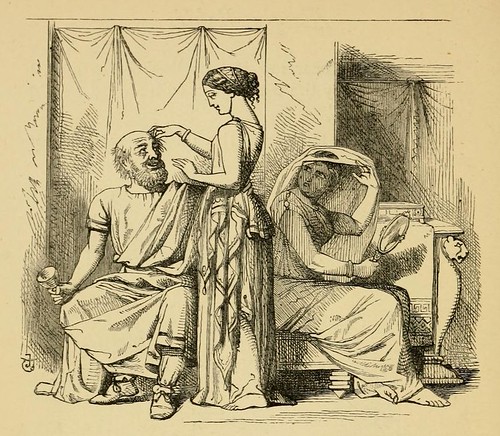HODIE (Roman Calendar): ante diem tertium decimum Kalendas Februarias.
MYTHS and LEGENDS: The art image for today's legend shows the Punishment of Tityus; you can also see the legends for the current week listed together here.

TODAY'S MOTTOES and PROVERBS:
TINY MOTTOES: Today's tiny motto is: Veritas superabit (English: The truth will triumph).
3-WORD PROVERBS: Today's 3-word verb-less proverb is E pluribus unum (English: One from many).
AUDIO PROVERBS: Today's audio Latin proverb is Fortuna gloriae carnifex (English: Fortune is the butcher of glory). To read a brief essay about this proverb and to listen to the audio, visit the Latin Via Proverbs blog.
PUBLILIUS SYRUS: Today's proverb from Publilius Syrus is: Stultum est vicinum velle ulcisci incendio (English: It's a foolish thing to punish your neighbor by setting his house on fire).
ERASMUS' ANIMALS: Today's animal proverb from Erasmus is Ars multa vulpi, ast una echino maxima (English: The fox has many a trick, but the hedgehog has just one big trick; from Adagia 1.5.18).
BREVISSIMA: The distich poster for today is Noli Differre. Click here for a full-sized view.

And here are today's proverbial LOLcats:


TODAY'S FABLES:
FABULAE FACILES: The fable from the Fabulae Faciles widget is Corvus et Mercurius, a story about a duplicitous crow who was rebuked by Mercury (this fable has a vocabulary list).
MILLE FABULAE: The fable from the Mille Fabulae et Una widget is Concubinae Duae, the story of a man with two lovers, one older and one younger.

Greek Bible Art - and Latin and English, too. Below is one of my Greek Bible Art graphics; for the individual Greek, Latin and English versions of the graphic, see the blog post: ἦσαν οἱ δύο γυμνοί καὶ οὐκ ᾐσχύνοντο. Erat uterque nudus, et non erubescebant. They were both naked, and were not ashamed.
